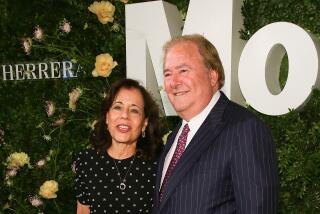Global’s Winnick Steps Down
- Share via
Gary Winnick on Monday resigned as chairman of Global Crossing Ltd., the telecommunications company he built from scratch into one of the brightest stars -- and most spectacular failures -- of the technology boom.
Once named the richest man in Los Angeles, Winnick was alternately hailed as a big charitable donor to zoo and library projects and reviled as a corporate scoundrel who cashed out at least $575 million in Global Crossing stock before the company collapsed into bankruptcy proceedings.
Winnick’s resignation was expected as part of the company’s reorganization plan, which was approved this month and pays creditors pennies on the dollar for the billions in debt Global Crossing used to build a worldwide fiber-optic network.
“In order for the company to have a shot at recovering, you have to bring in new leadership,” said Jeffrey Kagan, a telecommunications consultant in Marietta, Ga. “You have to wash away everyone that’s been tainted by the process and start clean.”
Although Chief Executive John Legere will stay at the company, Winnick’s co-chairman, Lodwrick Cook, is expected to be ousted when two Asian companies take over next year as majority shareholders. The company’s reorganization must still be reviewed by the Federal Communications Commission. Cook declined to comment.
Winnick, who will formally step down today, will return to his Beverly Hills investment banking firm, Pacific Capital Group.
“The collapse of the telecommunications industry ... has taken a terrible toll on employees and investors alike, with an unprecedented loss of billions in investments and tens of thousands of jobs,” Winnick, 55, said in a statement. “I deeply regret that so many good people involved with Global Crossing also suffered significant financial loss.”
Winnick, a former colleague of disgraced bond trader Michael Milken at Drexel Burnham Lambert, had no telecommunications experience when he raised $20 billion to launch Global Crossing in 1996.
Global Crossing declined to comment beyond a short statement from Legere.
“We want to extend our thanks to Gary Winnick,” he said. “His courage and dedication to a singular vision led to the completion of an advanced global IP [Internet Protocol] network that only five years ago existed as a concept on paper.”
But Andrew Odlyzko, director of the Digital Technology Center at the University of Minnesota, had a different take on Winnick’s tenure at Global Crossing. He predicted that it would be viewed historically as a lesson in greed.
“Anybody who looked intelligently at this business would have seen that this was a bubble, something that was bound to come to a bad end,” he said. “People years from now will not laud him as a builder or visionary.”
Federal prosecutors declined to pursue criminal charges against anyone at Global Crossing, but the firm’s accounting remains under investigation by the Securities and Exchange Commission. Global Crossing also faces shareholder lawsuits.
Winnick’s departure was widely seen as inevitable. Still, its timing was uncertain.
“Global Crossing was Gary’s baby,” said Terry Christensen, a spokesman for Winnick. “And he wanted to see it through, at least to a reorganized form.”
Christensen said Winnick also wanted to establish a $25-million fund to reimburse employees for losses they incurred in purchasing Global Crossing stock for their retirement plans. Winnick deposited the funds into an escrow account Dec. 19 to fulfill a pledge he made in October while testifying before Congress, but Christensen said Winnick was “still working on the mechanics” of how people would be reimbursed.
At the height of the company’s valuation in 1999, Winnick’s stock was worth $6 billion, and he was ranked the richest person in Los Angeles by the Los Angeles Business Journal. He sold at least $575 million in Global Crossing shares, using some of the proceeds to purchase and refurbish a historic 64-room mansion in Bel-Air. He also contributed millions to the Los Angeles Zoo, the Los Angeles Public Library and the Simon Wiesenthal Center.
During the company’s rise, Winnick lavished perks and salaries on his executives, and he personally oversaw a painstaking restoration of the company’s former executive offices in Beverly Hills, which included a re-creation of the Oval Office. But the company ultimately collapsed under the weight of its $12.4 billion in debt and filed for bankruptcy protection in January.
More to Read
Inside the business of entertainment
The Wide Shot brings you news, analysis and insights on everything from streaming wars to production — and what it all means for the future.
You may occasionally receive promotional content from the Los Angeles Times.









